
North Korea has diplomatic relations with 160 states. The country's foreign relations have been dominated by its conflict with South Korea and its historical ties to the Soviet Union. Both the government of North Korea and the government of South Korea claim to be the sole legitimate government of the whole of Korea. The de facto end of the Korean War left North Korea in a military confrontation with South Korea along the Korean Demilitarized Zone.

Yonhap News Agency (Korean: 연합뉴스) is a major South Korean news agency. It is based in Seoul, South Korea. Yonhap provides news articles, pictures and other information to newspapers, TV networks and other media in South Korea.

The Korean Central News Agency (KCNA) is the state news agency of North Korea. The agency portrays the views of the North Korean government for both domestic and foreign consumption. It was established on December 5, 1946, and now features online coverage.

South Korea has the raw materials and equipment to produce a nuclear weapon. However, it has not opted to make one. South Korea has continued on a stated policy of non-proliferation of nuclear weapons since 2004 and has adopted a policy to maintain a nuclear-free Korean Peninsula. By contrast, North Korea has and is developing additional nuclear weapons.
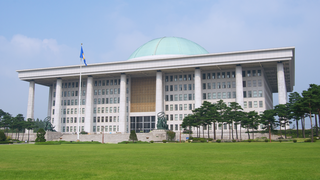
South Korean nationality law (Korean: 국적법) details the conditions in which an individual is a national of the Republic of Korea (ROK), commonly known as South Korea. Foreign nationals may naturalize after living in the country for at least five years and showing proficiency in the Korean language. All male citizens between the ages of 18 and 35 who are able-bodied and mentally competent are required to perform at least 18 months of compulsory military service or alternative civilian service.
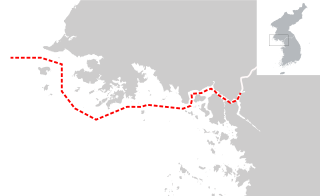
The Northern Limit Line or North Limit Line (NLL) – 북방한계선 – is a disputed maritime demarcation line in the Yellow (West) Sea between the Democratic People's Republic of Korea (DPRK) in the north, and the Republic of Korea (ROK) in the south. This line of military control acts as the de facto maritime boundary between North and South Korea.

The South Korean mass media consist of several different types of public communication of news: television, radio, cinema, newspapers, magazines, and Internet-based websites.

The Central Bank of the Democratic People's Republic of Korea is North Korea's central bank. Established on December 6, 1947, it issues the North Korean wŏn. The Bank is subordinated to the Cabinet of North Korea. Since 2023, the president of the bank has been Paek Min Gwang.
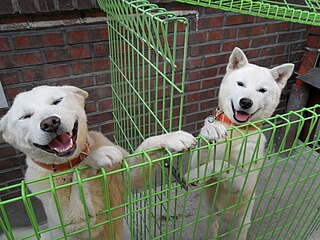
The Pungsandog (Korean: 풍산개) is a breed of hunting dog from Korea, named for originating in Kimhyonggwon County, formerly Pungsan County. They are also called Phungsan, Korean Phungsan, or Poongsan dogs.

Guinea-Bissau–North Korea relations refers to the current and historical relationship between Guinea-Bissau and the Democratic People's Republic of Korea (DPRK), commonly known as North Korea. Neither country maintains an embassy in their respective capitals.
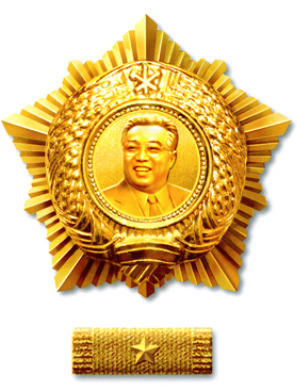
The Order of Kim Il Sung (Korean: 김일성훈장) is the highest order of North Korea, along with the Order of Kim Jong Il, and only second to one honorary title, the Hero of Labour.
Merited Athlete is an honorary title of North Korea given to sports persons. It is awarded to "athletes and workers engaged in the athletic field who make distinguished contributions to the nation's athletics, receiving the love and respect of the people for devoting themselves to national and social projects". A typical achievement is winning a regional competition in Asia. The title was instituted in November 1960.
In the year 2017, North Korea was involved in the 2017 North Korea crisis, along with other events. The country conducted a nuclear test in September, and several missile tests throughout the year. One of these was the country's first successful test of an intercontinental ballistic missile (ICBM), Hwasong-14. Two missiles were launched over Hokkaido in the Japanese archipelago, in August and in September 2017.

Central Bureau of Statistics is the national statistical office of North Korea.

Mexico–North Korea relations are the current and historical relations between Mexico and North Korea. In 2017, there were 366 North Koreans residing in Mexico.

Ghana and North Korea established diplomatic relations in 1964.
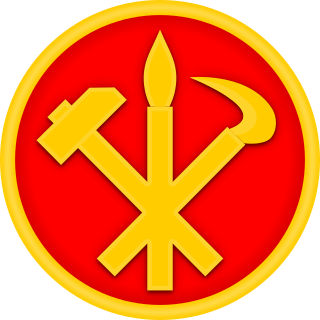
The United Front Department of the Workers' Party of Korea is a department of the Central Committee of the Workers' Party of Korea (WPK) tasked with relations with South Korea. It conducts propaganda operations and espionage and manages front organizations, including the Chongryon.
This is a list of works important to the study of North Korea.

Myanmar–South Korea relations are the bilateral relations between the Republic of the Union of Myanmar and the Republic of Korea. The two countries established their diplomatic relations on 16 May 1975.
















